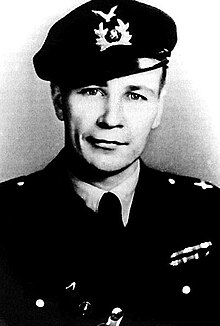Ilmari Juutilainen
Eino Ilmari Juutilainen (born February 21, 1914 in Lieksa , Finland , † February 21, 1999 in Tuusula ) was a Finnish fighter pilot . He achieved his fame through his missions in the Finnish Air Force during the Winter War (1939-1940) and in the Continuation War (1941-1944).
With 94 confirmed victories in 437 missions, Juutilainen was the top pilot among Finnish fighter pilots - making him the non-German top pilot from the Second World War who had the most kills. He flew Fokker D.XXI , Brewster Buffalo and Messerschmitt Bf 109 machines . Juutilainen was one of four men to receive the Mannerheim Cross, the highest Finnish military award, twice.
Juutilainen survived both wars without ever being shot down by enemy warplanes. Only once was he forced to land his machine because of a hit from his own flak . Like the Japanese fighter pilot Saburo Sakai , Juutilainen never lost any of his wingmen in combat.
Military career
Juutilainen began his military service in the Finnish Army on September 9, 1932 , and from 1935 he served as a pilot in the Finnish Air Force. On May 1, 1935, Juutilainen was promoted to sergeant. From March 3, 1939 he was used in the LeLv 24 . During the Winter War he flew a Fokker D.XXI .
During the period of the Continuation War, Juutilainen served in 3 / LeLv 24 and flew a Brewster B239 machine . With his BW-364 "Orangene 4" he shot down 28 enemy aircraft. In 1943 he came to LeLv 34 that the new Bf 109 G began. With this type of aircraft, he shot down 54 enemy machines. Juutilainen refused a promotion to officer because he feared that he would no longer be allowed to fly.
post war period
After the wars, Ilmari Juutilainen served in the Finnish Air Force until 1949. Until 1956 he worked as a professional pilot and flew passengers with his De Havilland Tiger Moth .
| personal data | |
|---|---|
| SURNAME | Juutilainen, Ilmari |
| ALTERNATIVE NAMES | Juutilainen, Eino Ilmari (full name) |
| BRIEF DESCRIPTION | Finnish fighter pilot |
| DATE OF BIRTH | February 21, 1914 |
| PLACE OF BIRTH | Lieksa , Finland |
| DATE OF DEATH | February 21, 1999 |
| Place of death | Tuusula |
